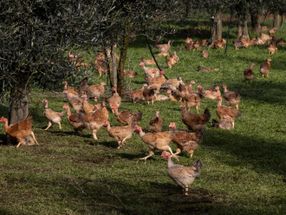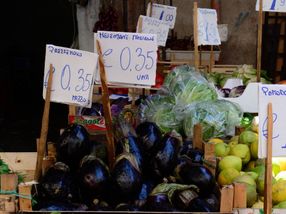After India's change of course: rice prices fall to 8-year low
Massive oversupply causes prices to fall and upsets the balance between producers and importers worldwide
Advertisement
Global rice prices have fallen by 35% within a year and, at around USD 360 per tonne, are at their lowest level since 2017, triggered by the lifting of export restrictions by India, the world's largest rice exporter. After three years of extreme market volatility, a massive oversupply is now causing prices to fall and shaking the balance between producers and importers worldwide, as an analysis by international credit insurer Coface shows.
As a leading rice exporter, India restricted its exports in 2022 in order to curb the sharp rise in global market prices, at least in its own country, and to ensure supplies for the Indian population. Prices rose by a total of 19% in 2022 and 2023 as a result of the war in Ukraine and unfavorable weather conditions in Asia. With the resumption of exports in 2024 and record-high harvests in Asia at the same time, prices fell by 35% within a year. A growing supply surplus is expected for 2026 - supported by positive production forecasts and a possible return of the La Niña weather phenomenon in the fourth quarter of 2025, which typically leads to increased rainfall in parts of Asia. "Prices should continue to fall until at least the end of 2025 and stabilize in 2026 at a level not seen for a decade," says Simon Lacoume, industry analyst at Coface.
Asia dominates, Africa remains dependent
Rice is the most widely consumed staple food worldwide - ahead of wheat and maize. Despite its importance for food security, rice is only traded on world markets to a limited extent. Asia is the main player here: the region accounts for almost 90 percent of global production and consumption. Sub-Saharan Africa, on the other hand, is heavily dependent on imports from Asia. "In 2024, five Asian countries accounted for 75 percent of global rice exports, including 40 percent from India alone. This high concentration increases the vulnerability of African countries to political decisions made by Asian economies," says Simon Lacoume.
Rice remains a politically sensitive product in many Asian countries. The continuing fall in prices is increasingly jeopardizing the profitability of producers, especially in countries with lower production capacity than India. The Philippines, one of the world's largest rice importers, has suspended imports since September 1 for an initial period of 60 days. The aim is to protect domestic rice farmers during the local harvest and stabilize prices. Indonesia is now also pursuing a strategy of food sovereignty and is increasingly focusing on promoting domestic agriculture in order to reduce dependence on imports in the long term.
Emerging countries are not the only ones relying on protectionist measures. Under the influence of agricultural lobby groups, Japan is also adhering to strict import quotas in order to protect domestic rice production. However, this policy threatens to disrupt the dynamics of the domestic market. The Japanese rice industry is facing a supply crisis - caused by the poor 2023 harvest due to extreme heat and reduced yields. Storage bottlenecks and a severe earthquake in southern Japan in August 2024 have further exacerbated the situation. Protectionist measures are keeping domestic prices high - especially with declining production. A 5 kg bag of rice currently costs around 4,000 yen in Tokyo, which is equivalent to around 26 US dollars. In comparison, an equivalent bag of Thai rice costs around 8 US dollars in Bangkok.
Note: This article has been translated using a computer system without human intervention. LUMITOS offers these automatic translations to present a wider range of current news. Since this article has been translated with automatic translation, it is possible that it contains errors in vocabulary, syntax or grammar. The original article in German can be found here.



























































